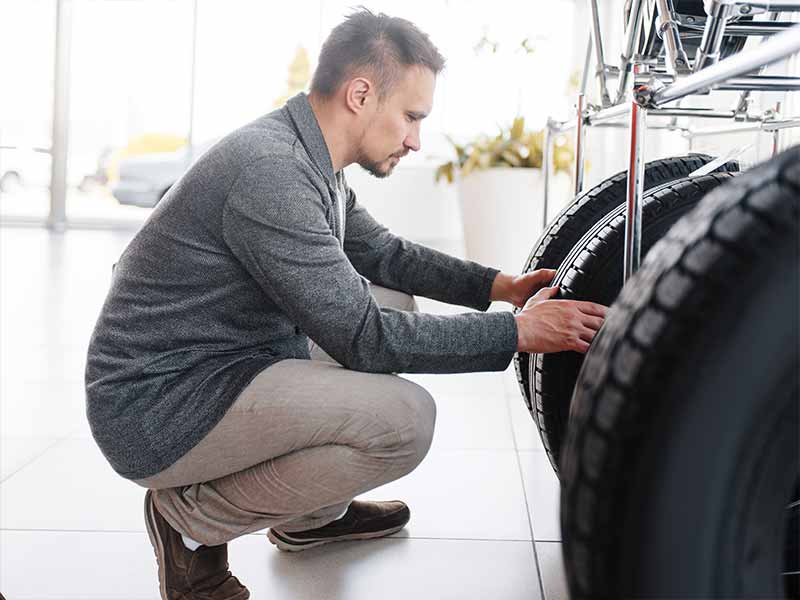Imagine cruising down the highway and suddenly feeling your car wobble, then realizing you have a blown tire. The adrenaline kicks in as you navigate to the roadside.
Tires are your first line of defense between you and the road. So, when it comes to buying new tires, asking the right questions is not just about saving money—it’s about ensuring your safety.
10 Questions To Ask When Buying Tires
- Given my specific driving needs, which type of tire best suits me best?
- What is the tread life expectancy and mileage warranty on these tires?
- How well do these tires perform in rain or snow compared to similarly priced tires?
- Are these tires considered noisy and do they ride hard or soft?
- What are the most popular tires you sell that fit my car/truck?
- What are the best tires you sell that fit my car/truck and do you feel they’re a good buy?
- Are there any tires you would recommend I avoid based on your first-hand experience?
- Always check for ongoing promotions or manufacturer rebates.
- What are the installation charges, and is a wheel alignment included or necessary?
- Do you offer any road hazard warranties or protection plans?
In this article, we’ll guide you through the entire process of buying and maintaining tires for your vehicle. From understanding different types of tires to key tips on longevity and a quick FAQ session, you’ll find all the essentials right here. We’ll even throw in some checklists to keep you on track.
Let’s take a closer look.

Questions To Ask When Buying Tires
1. Given my specific driving needs, which type of tire best suits me best?
Importance
This question cuts to the core of your tire purchase, helping you identify a tire that meets your unique driving requirements, whether that’s daily commuting, off-road adventures, or snowy conditions.
Benefits
Knowing which tire suits your needs can dramatically improve your driving experience and safety.
Suggestions
Consider the type of driving you do most often. For city commuting, all-season tires might suffice. If you live in a region with heavy snow, consider winter tires. Tailor this question by giving the dealer information about where and how you typically drive.
2. What is the tread life expectancy and mileage warranty on these tires?
Importance
This question helps you gauge the longevity of your investment, providing insight into both performance and the manufacturer’s confidence in their product.
Benefits
Knowing the tread life expectancy and mileage warranty can help you calculate long-term costs, giving you a more complete picture of the tire’s value.
Suggestions
If you don’t drive often, a lower-mileage tire might be sufficient and cost-effective. However, for regular or long-distance commuting, a higher-mileage warranty may be crucial.
3. How well do these tires perform in rain or snow compared to similarly priced tires?
Importance
Understanding how a tire performs in adverse weather conditions is critical for your safety.
Benefits
This question allows you to compare options within your budget, helping you get the best performance without over-spending.
Suggestions
If you live in a region prone to heavy rain or snow, emphasize this when asking the question. It’ll help the dealer recommend a tire that excels in those specific conditions.
4. Are these tires considered noisy and do they ride hard or soft?
Importance
Tire noise and ride comfort are important but often overlooked factors that can affect your daily driving experience.
Benefits
Knowing this information upfront can save you from long-term discomfort or dissatisfaction.
Suggestions
If you primarily drive on highways or enjoy peaceful drives, a quiet and soft-riding tire may be crucial for you. Make sure to specify these preferences.
5. What are the most popular tires you sell that fit my car/truck?
Importance
Popular tires are usually reliable and meet the general needs of most drivers.
Benefits
Following the crowd isn’t always a bad idea, especially if many people are satisfied with a particular tire.
Suggestions
Always balance popularity with your specific needs. A popular tire may not be the best fit for your unique driving conditions or climate.
6. What are the best tires you sell that fit my car/truck and do you feel they’re a good buy?
Importance
This question helps you tap into the dealer’s expertise, offering a chance to learn about high-quality options that are also good value.
Benefits
You’re more likely to end up with a top-quality tire that’s also a good deal, ensuring you get the most bang for your buck.
Suggestions
Clearly define what “best” means to you—whether that’s longest-lasting, best performance, or best for a specific condition like snow or rain.
7. Are there any tires you would recommend I avoid based on your first-hand experience?
Importance
Dealers often have invaluable practical knowledge about which tires tend to underperform or generate customer complaints.
Benefits
You’ll gain insights that could save you from making a poor investment, ensuring that you select a reliable and efficient tire.
Suggestions
Take this answer in context with your own needs and priorities. What one person considers a dealbreaker may not be as important for your specific situation.
8. Always check for ongoing promotions or manufacturer rebates.
Importance
Promotions and rebates can provide significant cost savings, making it easier for you to afford higher-quality tires or extra services like wheel alignment.
Benefits
Taking advantage of promotions or manufacturer rebates can make your tire purchase more cost-effective, and potentially allow you to buy a better set of tires than you might afford otherwise.
Suggestions
When you visit the tire dealer, proactively ask about any ongoing promotions or upcoming deals. Sometimes these are not advertised prominently, and inquiring directly can yield valuable information.
9. What are the installation charges, and is a wheel alignment included or necessary?
Importance
Understanding the full cost, including installation and any additional services like wheel alignment, is critical for budgeting your tire purchase.
Benefits
Knowing whether wheel alignment is included or necessary can affect both the immediate cost and long-term performance of your tires. A proper alignment can extend the life of your new tires and improve your vehicle’s handling.
Suggestions
If the dealer recommends wheel alignment, ask why. For instance, if you’ve been experiencing uneven tire wear or your vehicle has been pulling to one side, an alignment is likely a good idea. Tailor this question to your specific vehicle and driving experience.
10. Do you offer any road hazard warranties or protection plans?
Importance
Road hazard warranties or protection plans can save you from the high cost of premature tire replacement due to unforeseen road conditions like potholes or debris.
Benefits
Such warranties can offer peace of mind, especially if you often drive on less-than-perfect roads. You’ll know that you’re financially protected should your tires suffer unexpected damage.
Suggestions
Consider where you usually drive when asking this question. If you often navigate through rough terrains or poorly maintained roads, a road hazard warranty might be an excellent investment for you.
Making the Purchase: Steps and Precautions
Now that you know what type of tires you need and where to buy them, it’s time to make the purchase. But hold on—there are a few more things to consider to ensure you’re getting the best deal and setting yourself up for long-term safety and performance.
What to Do Before You Buy
Check the Condition of Your Current Tires
- Tread Depth: Measure the tread depth to confirm that you indeed need new tires.
- Uneven Wear: Check for uneven wear patterns, as this could indicate alignment issues.
Confirm Your Vehicle’s Specifications
- Owner’s Manual: Double-check the recommended tire size and speed ratings from your vehicle’s owner’s manual.
- Consult the Dealer: Discuss your specific needs and driving conditions with the tire dealer to get personalized advice.
Look for Deals and Rebates
- Promotions: Some dealers offer seasonal or brand-specific promotions.
- Rebates: Manufacturers often provide rebates on certain models. Check the tire manufacturer’s website for current offers.
Making the Purchase
Quantity: How Many to Buy?
- Full Set: If all your tires are worn out, it’s best to replace all four at once for balanced handling and wear.
- Partial Set: If only one or two tires are worn or damaged, you may opt for a partial set. However, ensure they’re the same type and brand as the existing tires for uniform performance.
What About Alignment?
- Need for Alignment: When you get new tires, especially a full set, it’s often advisable to get an alignment to ensure even wear and optimal performance.
- Check with Dealer: Many tire shops offer free alignment checks or discounted alignment services when you buy new tires.
Additional Services
- Tire Rotation: Consider a rotation schedule as part of your purchase. Some dealers offer this as a free service for the life of the tires.
- Protection Plans: Some dealers offer road hazard warranties or protection plans. Weigh the costs and benefits before adding these to your purchase.

Where to Buy? Picking a Trustworthy Dealer
Choosing where to buy your tires is almost as important as choosing the tires themselves. A trustworthy dealer not only offers quality products but also provides professional advice and installation services. Here’s how to pick the right place for your tire purchase.
Types of Tire Shops
Big-Box Retailers
- What They Are: These are large chain stores that offer a wide range of products, including tires.
- Pros:
- Competitive pricing
- Nationwide presence
- Cons:
- Limited expertise in tires
- May lack specialized services
- Ideal For: Budget-conscious buyers who already know what they need.
Specialty Tires Shops
- What They Are: Stores specialized in selling tires and offering related services.
- Pros:
- Expert staff
- Comprehensive services (e.g., alignment, rotation)
- Cons:
- May be more expensive
- Limited locations
- Ideal For: Those looking for expert guidance and full-service solutions.
Online Dealers
- What They Are: Websites where you can purchase tires and have them shipped to you or a local installer.
- Pros:
- Convenience
- Wide selection
- Cons:
- Can’t inspect tires before purchase
- Installation not included
- Ideal For: Savvy buyers who are comfortable buying online.
Checking the Quality of the Dealer
Reputation and Reviews
- Online Reviews: Check customer reviews on platforms like Google and Yelp to gauge the dealer’s reputation.
- Word of Mouth: Recommendations from friends and family can also be very reliable.
Authenticity and Age of Tires
- Check DOT Code: Every tire has a Department of Transportation code, often on the sidewall, which includes the manufacturing date. Ensure the tires are not too old.
- Brands Carried: Reputable dealers usually stock reputable brands. Look for well-known tire manufacturers in their product lineup.
Return and Warranty Policies
- Warranty: Ensure that the dealer offers a manufacturer’s warranty on new tires.
- Return Policy: A fair return policy indicates a confident and trustworthy dealer.
Other Services Offered
- Alignment and Installation: Some shops offer free alignment checks and discounted installation when you purchase tires.
- Tire Rotation and Maintenance: Look for dealers who offer ongoing maintenance services to get the most out of your purchase.
Post-Purchase Steps
Receipt and Warranty Documentation
- Keep All Paperwork: Always keep your purchase receipt and any warranty documentation.
- Register Your Tires: Some manufacturers allow you to register your new tires, making it easier to be notified of recalls or other important information.
Inspect the Installation
- Proper Inflation: Check that the tires are inflated to the recommended pressure, usually found on a sticker inside the driver’s side door or in the owner’s manual.
- Quality Check: Take a close look to ensure the tires are seated properly on the rims and that there are no visible defects.
Reading the Fine Print
When you’re buying tires, it’s crucial to pay attention to the details that are often overlooked. Tires come with specifications, ratings, and sizes that may seem like small print but are vital for your vehicle’s safety and performance. Here’s what you need to know.
Tire Size Matters
Finding Your Tire Size
- Check the Sidewall: Your current tires’ sidewalls will have a series of numbers and letters. This is the tire size.
- Vehicle’s Manual: The owner’s manual will list the manufacturer-recommended tire size.
- Online Resources: Some websites and apps can suggest the exact tires you need based on your vehicle model.
Why Stick to Recommended Size
- Safety: Incorrect tire sizes can affect braking, handling, and even the structural integrity of the tire.
- Performance: The right size ensures optimal performance in different conditions.
- Fuel Efficiency: Proper tire size can also impact your fuel consumption.
Upgrading or Downgrading
- Consult Experts: If you wish to change the tire size for performance or aesthetic reasons, it’s crucial to consult tire professionals to ensure safety and compatibility.
What’s a Speed Rating?
Understanding Speed Ratings
- Letter Code: Speed ratings are represented by a letter ranging from ‘L’ (lowest) to ‘Y’ (highest), which indicates the maximum speed the tire can safely sustain.
- Location: This is usually found on the tire sidewall along with the tire size.
Why Does It Matter?
- Safety: A tire with an inadequate speed rating may not handle well at high speeds.
- Performance: Matching or exceeding your vehicle’s speed needs ensures optimal performance.
Types of Ratings and Common Usage
- S Rating: Standard for many passenger vehicles. Suitable for speeds up to 112 mph.
- T Rating: Commonly found in family cars and minivans. Good for up to 118 mph.
- H, V, W Ratings: Suited for sports cars and luxury sedans. Can handle speeds from 130 mph to 168 mph.
- Ratings for Light Trucks: These may differ, and it’s essential to consult your vehicle manual or a tire expert for guidance.
Cross-referencing With Your Needs
- Daily Driving: For most daily drivers, an ‘S’ or ‘T’ speed rating is adequate.
- Performance Driving: If you’re into high-speed driving, consider higher speed ratings like ‘H’, ‘V’, or ‘W’.
- Off-road or Towing: Light truck tires may have specific ratings. Consult a tire dealer for precise information.
Resources
Below are some links you may find helpful when learning about tires
- New tire buying guide: Everything you need to know – Car & Driver
- Where and how to buy tires for your car – Bridgestone
Final Thoughts
Remember, the key to a successful tire purchase lies in asking the right questions tailored to your unique needs and driving conditions. From understanding what type of tire best suits your driving needs to assessing tread life and even the nuances of ride comfort, these questions serve as your road map.
Trust your own experience, tap into the expertise of tire dealers, and you’ll be well-equipped to make a decision that combines both quality and safety.
Good luck and happy motoring.





